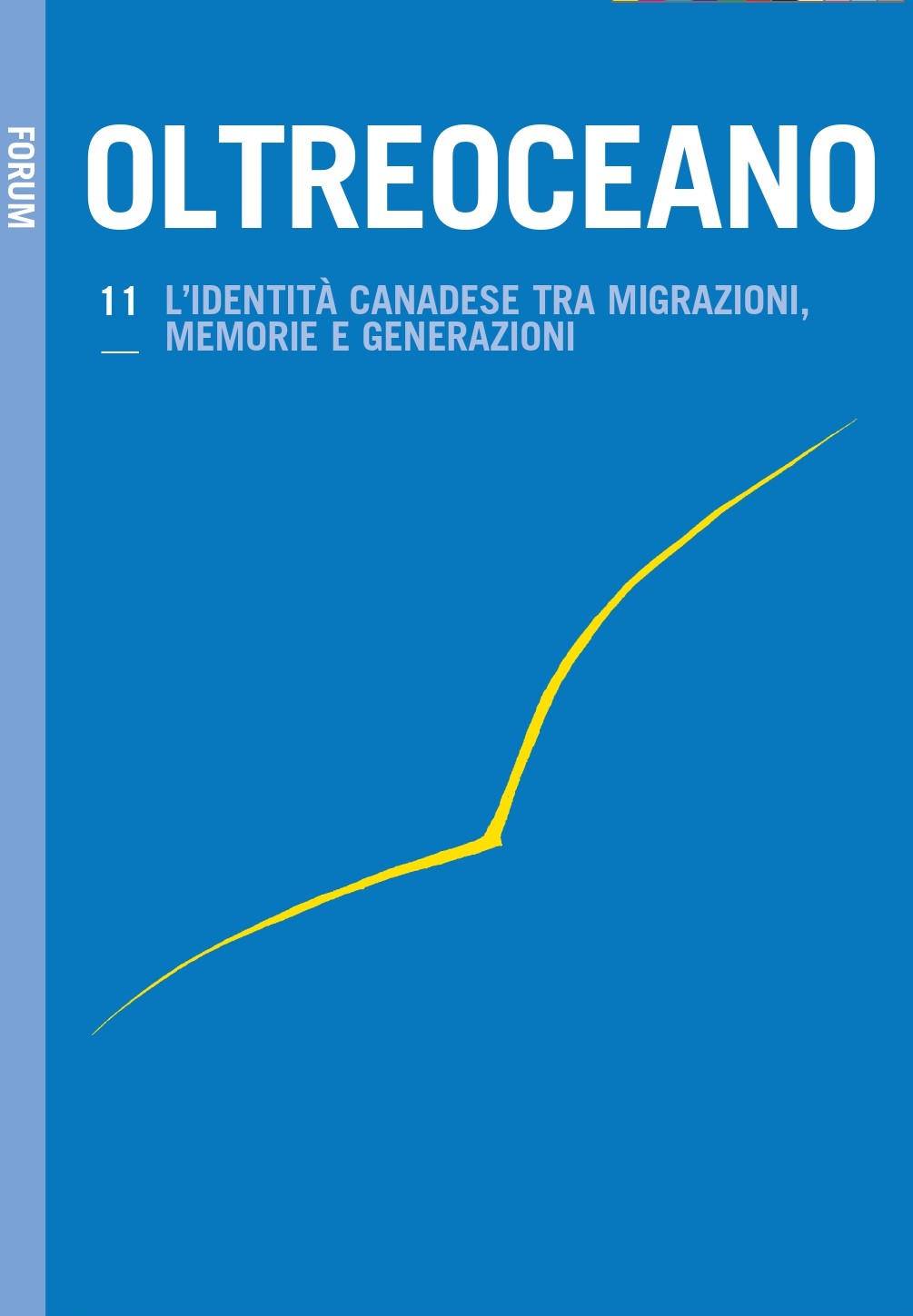Aging, Memory and Identity: Alice Munro’s “The Bear Came Over the Mountain” and “In Sight of the Lake”
Parole chiave:
Munro, aging, memory, identityAbstract
Aging and its effects on both body and mind figure in many of Alice Munro’s stories, but in a way her characters age with her, and loss of memory and problems of identity disintegration become more crucial in the late period. This essay explores the representation of old age in Alice Munro’s fiction, focusing on “The Bear Came Over the Mountain” and “In Sight of the Lake”, two compelling stories that portray painful forms of dementia and Alzheimer’s disease. The analysis addresses both thematic and stylistic issues, discussing the connections between selfhood and memory and highlighting the technical and structural devices masterly employed by the writer to communicate the feeling of disorientation and identity fragmentation.
Senilità, memoria e identità in “The Bear Came Over the Mountain” e “In Sight of the Lake” (In vista del lago) di Alice Munro
Il processo di invecchiamento e i suoi effetti su corpo e mente sono presenti in molti racconti di Alice Munro, ma si potrebbe dire che i suoi personaggi invecchiano con lei e perdita della memoria e disintegrazione dell’identità diventano argomenti più pressanti nell’ultimo periodo. Questo saggio esplora la rappresentazione della vecchiaia nella narrativa di Munro, con particolare riferimento a “The Bear Came Over the Mountain” e “In Sight of the Lake (“In vista del lago”), due testi con personaggi afflitti da demenza senile e Alzheimer. L’analisi si propone di indagare l’argomento sia dal punto di vista tematico che da quello stilistico, evidenziando i dispositivi tecnici e strutturali magistralmente usati dalla scrittrice per comunicare disorientamento e frammentazione.
Downloads
Riferimenti bibliografici
Collier, G. (2002): The Casual Measure of All Things: Age and Ageing in Alice Munro. In M. O’Neill & C. Zamorano Llena (Eds.), The Aesthetics of Ageing: Critical Approaches to Literary Representations of the Ageing Process (pp. 45-62). Lerida: Universitad de Lleida.
Cox, A. (2013): Age Could Be Her Ally’: Late Style in Alice Munro’s Too Much Happiness. In Ch. May (Ed.), Critical Insights: Alice Munro (pp. 276-290). Ipswich: Salem.
DeFalco, A. (2010): Uncanny Subjects: Aging in Contemporary Narrative. Columbus: Ohio State UP.
DeFalco, A. (2014): Uncanny Witnessing: Dementia, Narrative, and Identity in Fiction by Munro and Franzen. In U. Kriebernegg, R. Maierhofer & B. Ratzenböck (Eds.), Alive and Kicking at All Ages: Cultural Constructions of Health and Life (pp. 221-242). Blelefeld: Transcript Verlag.
Francescato, S. (2016): Resisting Acquiescence: Late-Life Friendship in Alice Munro’s Mrs. Cross and Mrs. Kidd. Oltreoceano, 11, pp. 41-48.
Francesconi, S. (2009): Memory and Desire in Alice Munro’s Stories. Textus, 22, pp. 341-360.
Francesconi, S. (2015): Alice Munro, il piacere di raccontare. Roma: Carocci.
Jamieson, S. (2013): Surprising Developments: Midlife in Alice Munro’s Who Do You Think You Are. Canadian Literature / Littérature canadienne, 217, pp. 54-69.
Jamieson, S. (2014): Reading the Spaces of Age in Alice Munro’s The Bear Came Over the Mountain. Mosaic, 47, 3, pp. 1-17.
Life, P. (2014): Shaking off Shackles. LTC Havens in ‘The Bear Came Over the Mountain’ and the Other Sister. In U. Kriebernegg, R. Maierhofer & B. Ratzenböck (Eds.), Alive and Kicking at All Ages: Cultural Constructions of Health and Life (pp. 243-258). Blelefeld: Transcript Verlag.
Munro, A. (1987): Lichen. In A. Munro, The Progress of Love (pp. 39-70). London: Penguin.
Munro, A. (1991): Mrs Cross and Mrs Kidd. In A. Munro, The Moons of Jupiter (pp.160-180). London: Vintage.
Munro, A. (1991). Spelling. In A. Munro, The Beggar Maid (pp.178-192). London: Vintage.
Munro, A. (1997): Introduction. In A. Munro, Selected Stories (pp. xiii-xxi). London: Vintage.
Munro, A. (2001): The Bear Came Over the Mountain. In A. Munro, Hateship, Friendship, Courtship, Loveship, Marriage (pp. 275-323). London: Vintage.
Munro, A. (2001): What Is Remembered. In A. Munro, Hateship, Friendship, Courtship, Loveship, Marriage (pp. 219-242). London: Vintage.
Munro, A. (2012): In Sight of the Lake. In A. Munro, Dear Life (pp. 317-232). London: Vintage.
Rohr, L. (2014): Getting Lost in Sight of the Lake. In E.-S. Zehelein (Ed.), For (Dear) Life: Close Readings of Alice Munro’s Ultimate Fiction (pp. 87-98). Berlin: Lit Verlag.
Roy, W. (2009): The Word is Colander: Language Loss and Narrative Voice in Fictional Canadian Alzheimer’s Narratives. Canadian Literature / Littérature Canadienne, 203, pp. 41-61.
Simal, B. (2014): Memory Matters: Alice Munro’s Narrative Handling of Alzheimer’s in The Bear Came Over the Mountain and in Sight of the Lake. Miscelànea, 50, pp. 61-78.
Simon, L. (2014): Battling the Invincible Predator: Alzheimer’s Disease as Metaphor. The Journal of American Culture, 37, 1, pp. 5-15.
Stewart, N. (2012): Review of Dear Life. Civilian Global. Retrieved from http://civilianglobal.com/arts/review-dear-life-by-alice-munro-best-books-of-the-year-2012/
Thacker, R. (2011): Alice Munro: Writing Her Lives. A Biography, 2005. Toronto: McClelland & Stewart.
Ventura, H. (2010): The Skald and the Goddess: Reading The Bear Came Over the Mountain by Alice Munro. Journal of the Short Story in English, 55. Retrieved from http:/jsse.revues.org/index1121. html: 2-11
Collier, G. (2002): The Casual Measure of All Things: Age and Ageing in Alice Munro. In M. O’Neill & C. Zamorano Llena (Eds.), The Aesthetics of Ageing: Critical Approaches to Literary Representations of the Ageing Process (pp. 45-62). Lerida: Universitad de Lleida.
Cox, A. (2013): Age Could Be Her Ally’: Late Style in Alice Munro’s Too Much Happiness. In Ch. May (Ed.), Critical Insights: Alice Munro (pp. 276-290). Ipswich: Salem.
DeFalco, A. (2010): Uncanny Subjects: Aging in Contemporary Narrative. Columbus: Ohio State UP.
DeFalco, A. (2014): Uncanny Witnessing: Dementia, Narrative, and Identity in Fiction by Munro and Franzen. In U. Kriebernegg, R. Maierhofer & B. Ratzenböck (Eds.), Alive and Kicking at All Ages: Cultural Constructions of Health and Life (pp. 221-242). Blelefeld: Transcript Verlag.
Francescato, S. (2016): Resisting Acquiescence: Late-Life Friendship in Alice Munro’s Mrs. Cross and Mrs. Kidd. Oltreoceano, 11, pp. 41-48.
Francesconi, S. (2009): Memory and Desire in Alice Munro’s Stories. Textus, 22, pp. 341-360.
Francesconi, S. (2015): Alice Munro, il piacere di raccontare. Roma: Carocci.
Jamieson, S. (2013): Surprising Developments: Midlife in Alice Munro’s Who Do You Think You Are. Canadian Literature / Littérature canadienne, 217, pp. 54-69.
Jamieson, S. (2014): Reading the Spaces of Age in Alice Munro’s The Bear Came Over the Mountain. Mosaic, 47, 3, pp. 1-17.
Life, P. (2014): Shaking off Shackles. LTC Havens in ‘The Bear Came Over the Mountain’ and The Other Sister. In U. Kriebernegg, R. Maierhofer & B. Ratzenböck (Eds.), Alive and Kicking at All Ages: Cultural Constructions of Health and Life (pp. 243-258). Blelefeld: Transcript Verlag.
Munro, A. (1987): Lichen. In A. Munro, The Progress of Love (pp. 39-70). London: Penguin.
Munro, A. (1991): Mrs Cross and Mrs Kidd. In A. Munro, The Moons of Jupiter (pp.160-180). London: Vintage.
Munro, A. (1991). Spelling. In A. Munro, The Beggar Maid (pp.178-192). London: Vintage.
Munro, A. (1997): Introduction. In A. Munro, Selected Stories (pp. XIII-XXI). London: Vintage.
Munro, A. (2001): The Bear Came Over the Mountain. In A. Munro, Hateship, Friendship, Courtship, Loveship, Marriage (pp. 275-323). London: Vintage.
Munro, A. (2001): What Is Remembered. In A. Munro, Hateship, Friendship, Courtship, Loveship, Marriage (pp. 219-242). London: Vintage.
Munro, A. (2012): In Sight of the Lake. In A. Munro, Dear Life (pp. 317-232). London: Vintage.
Rohr, L. (2014): Getting Lost in Sight of the Lake. In E.-S. Zehelein (Ed.), For (Dear) Life: Close Readings of Alice Munro’s Ultimate Fiction (pp. 87-98). Berlin: Lit Verlag.
Roy, W. (2009): The Word is Colander: Language Loss and Narrative Voice in Fictional Canadian Alzheimer’s Narratives. Canadian Literature / Littérature Canadienne, 203, pp. 41-61.
Simal, B. (2014): Memory Matters: Alice Munro’s Narrative Handling of Alzheimer’s in The Bear Came Over the Mountain and in Sight of the Lake. Miscelànea, 50, pp. 61-78.
Simon, L. (2014): Battling the Invincible Predator: Alzheimer’s Disease as Metaphor. The Journal of American Culture, 37, 1, pp. 5-15.
Stewart, N. (2012): Review of Dear Life. Civilian Global. Retrieved from http://civilianglobal.com/arts/review-dear-life-by-alice-munro-best-books-of-the-year-2012/
Thacker, R. (2011): Alice Munro: Writing Her Lives. A Biography, 2005. Toronto: McClelland & Stewart.
Ventura, H. (2010): The Skald and the Goddess: Reading The Bear Came Over the Mountain by Alice Munro. Journal of the Short Story in English, 55. Retrieved from http:/jsse.revues.org/index1121. html
Downloads
Pubblicato
Come citare
Fascicolo
Sezione
Licenza

Questo lavoro è fornito con la licenza Creative Commons Attribuzione - Non commerciale - Condividi allo stesso modo 4.0 Internazionale.
Gli autori si impegnano a rispettare le seguenti condizioni, che s’intendono accettate al momento della sottomissione per la stampa dei propri contributi.
L’invio di un testo implica che esso sia inedito e non in attesa di essere pubblicato altrove.Gli autori si impegnano a rispettare le seguenti condizioni, che s’intendono accettate al momento della sottomissione per la stampa dei propri contributi.
- Qualora venga accettato, l’autore conferisce all’editore il diritto di pubblicarlo e distribuirlo sia in forma cartacea che nell’edizione elettronica in rete. Gli articoli pubblicati saranno scaricabili e resi disponibili in open access.
- Purché segnali correttamente che la prima pubblicazione è avvenuta sulla rivista «Oltreoceano. Rivista sulle migrazioni», l’autore ha facoltà di: a) riprodurre l’articolo in estratti separati o raccolti in volume; b) pubblicare l’articolo nel proprio sito personale o in quello di corsi di insegnamento purché si tratti di siti di natura non commerciale; c) depositare l’articolo in archivi online di carattere non commerciale, legati all’istituzione di appartenenza o come parte di progetti di diffusione non commerciale e open access dei lavori scientifici.
Non è consentita l’utilizzazione dei contributi da parte di terzi, per fini commerciali o comunque non autorizzati. L’editore declina ogni responsabilità sull’uso non autorizzato del materiale pubblicato sulla rivista.













